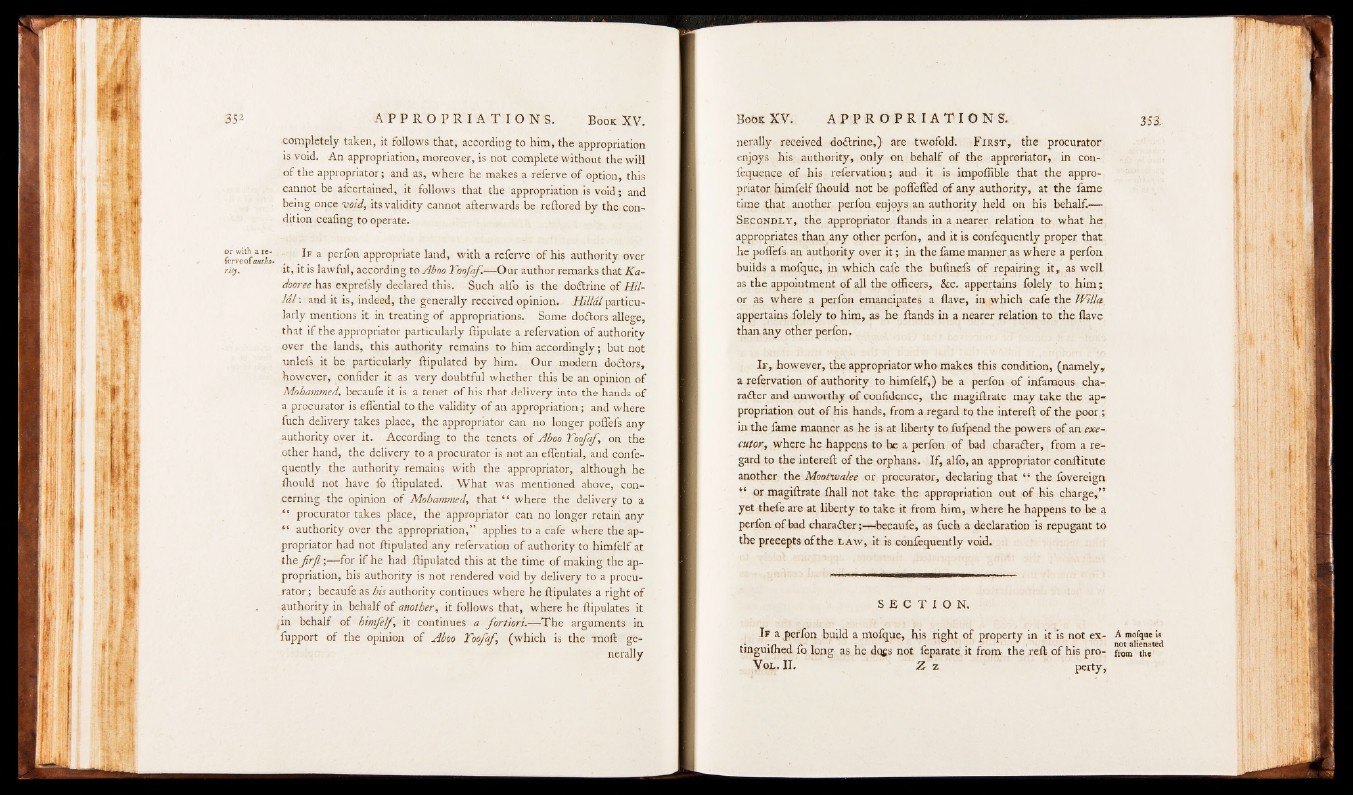
i m
m i
i j r j
I I f 3 S2
j J v j j
i l l or with a re-
* ferveofautho
rity.
i f f :
p i f i l ;
completely taken, it follows that, according to him, the appropriation
is void. An appropriation, moreover, is not complete without the will
of the appropriator; and as, where he makes a referve of option, this
cannot be afcertained, it follows that the appropriation is void; and
being once void, its validity cannot afterwards be reftored by the condition
ceafing to operate.
If a perfon appropriate land, with a referve of his authority over
it, it is lawful, according to Aboo Yoofaf.— Our author remarks that Ka-
dooree has exprefsly declared this. Such alfo is the doctrine of Hil-
la l: and it is, indeed, the generally received opinion. Hillal particularly
mentions it in treating of appropriations. Some doctors allege,
that if the appropriator particularly ftipulate a refervation of authority
over the lands, this authority remains to him accordingly; but not
unlefs it be particularly ftipulated by him. Our modern doctors,
however, confider it as very doubtful whether this be an opinion of
Mohammed, becaufe it is a tenet of his that delivery into the hands of
a procurator is eflential to the validity of an appropriation; and where
fuch delivery takes place, the appropriator can no longer poffefs any
authority over it. According to the tenets of Aboo Yoofaf, on the
other hand, the delivery to a procurator is not an eflential, and confe-
quently the authority remains with the appropriator, although he
fliould not have fo ftipulated. What was mentioned above, concerning
the opinion of Mohammed, that “ where the delivery to a
“ procurator takes place, the appropriator can no longer retain any
“ authority over the appropriation,” applies to a cafe where the appropriator
had not ftipulated any refervation of authority to himfelf at
the — for if he had ftipulated this at the time of making the appropriation,
his authority is not rendered void by delivery to a procu-
. rator; becaufe as his authority continues where he ftipulates a right of
authority in behalf of another, it follows that, where he ftipulates it
4in behalf of himfelf, it continues a fortiori.— The arguments in
fupport of the opinion of Aboo Yoofaf, (which is the Tnoft generally
II., I
nerally received doctrine,) are twofold. First, the procurator
enjoys his authority, only on behalf of the approriator, in con-
fequence of his refervation; and it is impoflible that the appropriator
himfelf Ihould not be poflefled of any authority, at the lame
time that another perfon enjoys an authority held on his behalf.—
Secondly, the appropriator ftands in a nearer relation to what he
appropriates than any other perfon, and it is coufequcntly proper that
he poflefs an authority over it; in the fame manner as where a perfon
builds a mofque, in which cafe the bufinefs of repairing it, as well
as the appointment of all the officers, &c. appertains folely to him;
or as where a perfon emancipates a Have, in which cafe the Wtlla
appertains folely to him, as he ftands in a nearer relation to the Have
than any other perfon.
If , however, the appropriator who makes this condition, (namely,
a refervation of authority to himfelf,) be a perfon of infamous cha-
radter and unworthy of confidence, the magiftrate may take the appropriation
out of his hands, from a regard to the intereft of the poor;
in the fame manner as he is at liberty to fufpend the powers of an executor,
where he happens to be a perfon of bad character, from a regard
to the intereft of the orphans. If, alfo, an appropriator conftitute
another the Mootwalee or procurator, declaring that “ the fovereign
“ or magiftrate fhall not take the appropriation out of his charge,”
yet thefe are at liberty to take it from him, where he happens to be a
perfon of bad character;— -becaufe, as fuch a declaration is repugant to
the precepts of the law, it is confequently void.
S E C T I O N .
If a j>erfon build a mofque, his right of property in it is not ex- A nvofque is
tinguifhed fo long as he dqgs not feparate it from- the reft of his pro- from the
Y ol. II. Z z perty,